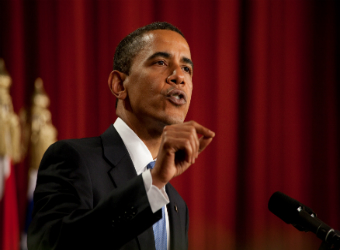The Obama administration announced on Wednesday it was cutting off sales of some military hardware to Egypt in disapproval at the Egyptian regime’s security crackdown since the overthrow of Mohamed Morsi in July.
Washington suspended deliveries of F16 fighter jets to Egypt’s ruling military, and will not deliver M1A1 tank kits, Harpoon missiles and Apache helicopters, “pending credible progress toward an inclusive, democratically elected civilian government through free and fair elections,” State Department spokeswoman Jen Psaki announced on Wednesday.
Administration officials estimated the big-ticket military hardware to represent hundreds of millions of dollars. The US provides Egypt with $1.3bn of military aid annually, in a programme that has lasted three decades.
But senior administration officials, in a conference call with reporters, repeatedly emphasised that they valued “continuing a strong relationship with Egypt,” one of its closest military partners in the Middle East. They referred to the decision as a “recalibration” rather than a new bilateral relationship.
Cash assistance to the Egyptian military government will be suspended under the “recalibration,” but most economic assistance – worth about $250m in normal years – will continue. Much of the US military partnership with Egypt will go on, such as counter-terrorism operations, border security aimed at reassuring Israel, which has expressed support for the coup, and help securing the unstable Sinai peninsula, a major transit point for weapons bound for Gaza and northern Africa.
Training and education efforts designed to professionalize the Egyptian military will also go ahead, even though the military took power by force, which is usually what such efforts emphasise avoiding.
Administration officials said that they will continue to revisit the aid decision, in an attempt to incentivise the Egyptian military to relinquish power. But the officials bridled at the suggestion they were sending a mixed message to Egypt’s generals, particularly as it comes three months after the coup, which inflicted some of the bloodiest massacres in recent Egyptian history.
“Holding up deliveries of hundreds of millions of dollars of military assistance is a pretty clear message,” said a senior administration official who would not be quoted on the record.
Nor will the Obama administration call the military takeover a coup, since to do so would trigger an automatic aid cutoff under rules imposed by Congress. “We don’t think we need to make a determination,” a senior administration official said.
Rumours of the impending aid “recalibration” had been circulating for nearly 24 hours, and caused some confusion in Egypt. “The US is pressuring Egypt to allow the Muslim Brotherhood back into politics, and it won’t work,” former constitutional court justice Tahani al-Gabali told the Wall Street Journal, referring to the deposed government. “Unfortunately, the current American administration has a failed foreign policy.”
The administration’s move is in response to a review announced by the US after General Abdel-Fatah al-Sisi, Egypt’s defence minister, removed the democratically elected but deeply unpopular Morsi. The coup won huge popular backing but infuriated supporters of the president’s Muslim Brotherhood.
Hundreds of people, many of them Brotherhood supporters, have been killed by state security forces since then. On Sunday, another bloody day, state media reported 57 people dead in Cairo.
It was announced that Morsi and 14 others charged with the killings of protesters outside his palace last December are to stand trial on 4 November. The ministry for social solidarity also said that the Muslim Brotherhood had now been dissolved – a move seen by many as a throwback to the era of Hosni Mubarak, who ruled Egypt for 30 years before he was overthrown in the 2011 revolution.
It is unclear what the impact will be. “I worry this partial aid ‘cut’ is to show we’re doing something, without actually accomplishing anything,” said analyst Shadi Hamid of the Brookings Institution in Doha.
“It’s foreign policy by gesture. Once again, our Egypt policy is divorced from any broader strategy or vision for the bilateral relationship.”
Nervana Mahmoud, an Egyptian commentator, called the US debate about cutting aid to Egypt “disappointing, and missing the point”.
Sisi warned in an interview that Egypt would not tolerate pressure, “whether through actions or hints”. Britain, facing a similar dilemma to the US, has announced the cancellation of export licences for equipment that could be used for internal repression.
Tamara Coffman Wittes of the Saban Centre for Middle East Policy in Washington said the Egyptian military was unlikely to overreact to the move. “The administration hopes to show it won’t be overly influenced on Egypt policy by Gulf and Israeli lobbying for total aid resumption. And it hopes to sustain a working relationship with the people who are running Egypt – an objective which has been perhaps the only consistent component of the US approach toward Egypt since the 2011 revolution.”
Source: The Guardian


